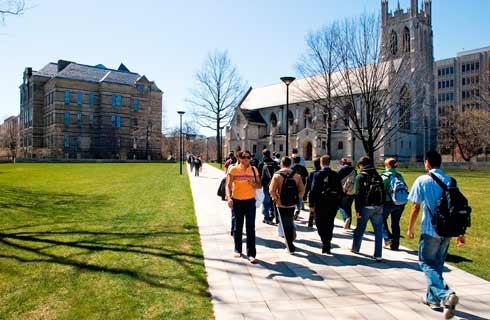统计学理学硕士
Master of Science in Statistics

学历文凭
Masters Degree

专业院系
Department of Mathematics and Statistics

开学时间

课程时长

课程学费

国际学生入学条件
100 TOEFLI Minimum score
7 IELTS Minimum score
Prerequisites for admission include courses in Calculus, Linear Algebra, Computer Programming, and Statistical Methods. Analysis and Advanced Linear Algebra is recommended, as well as additional statistics classes. Applicants with at least a B (3.0 on a 4.0 scale) grade point Avg, or the equivalent in the last 60 graded semester (90 quarter) hours, from an accredited college or university, or at least a B grade point Avg in any graduate work from a recognized graduate school are eligible for admission to regular student status. Applicants with at least 12 semester hours of approved coursework from accredited graduate schools with at least a B grade point Avg are eligible for admission to regular student status.
IDP—雅思考试联合主办方

雅思考试总分
7.0
- 雅思总分:7
- 托福网考总分:100
- 托福笔试总分:600
- 其他语言考试:MELAB: at least 86
CRICOS代码:
申请截止日期: 请与IDP联系 以获取详细信息。
课程简介
Graduate students study with graduate faculty who are on the forefront of research in areas of current global interest such as: mathematical modeling in population genetics, muscle physiology, and biomolecular systems, optimization problems on high performance computing environments, partial differential equations in control theory, swimming phenomenon, materials research, microwave heating and inverse problems, geometric analysis with a parallel focus on applications to data modeling and analysis, statistics related to bioinformatics and large data, multiple comparisons, experimental design, linear models, change-point problems, quality control, engineering reliability and risk analysis, probability including martingale methods, stochastic differential equations, stochastic simulation, and extreme value theory, matrix algebra including both computational and theoretical analyses, mathematics education research associated with teacher preparation, use of technology, and culturally relevant pedagogy, discrete mathematics that includes cryptography, combinatorics, and number theory, and environmental mathematics such as contaminant transport in groundwater, population ecology, and predator-prey problems. Graduate students participate in graduate seminars and undertake collaborative and cross-disciplinary research.
相关申请
 预科
预科 奖学金
奖学金 实习机会
实习机会 在校学习
在校学习 跨境学习
跨境学习 校园授课-线上开始
校园授课-线上开始 在线/远程学习
在线/远程学习
开学时间&学费
学费信息仅供参考,请与IDP联系以获取详细信息
| 开学时间 | 时长 | 学费 | 地点 |
|---|---|---|---|
| 暂无 | 暂无 | 暂无 | 暂无 |
学校排名

世界排名301
数据源:
泰晤士高等教育世界大学排名
关于华盛顿州立大学

华盛顿州立大学(WSU)热烈欢迎所有国际学生加入WSU的''美洲狮''大家庭。华盛顿州立大学是美国西部历史最悠久的赠地大学之一,自1890年以来一直激励着问题解决者。华盛顿州立大学(WSU)的目标是提供鼓励学习者让世界变得更美好的教育。学生在整个职业生涯里都是个人和全球专业关系网中的一员,并享有终身会员资格。国际学生占学生群体总人数的百分之七,代表着115多个国家/地区 。海外学生受益于许多机会,例如出国留学和职业发展活动。该大学提供超过4亿美元的奖学金和学生资助,其中有几个奖项只为国际学生办法。学校共有98个本科专业, 78个硕士学位和65个博士学位课程可供学习。 其中有三个专业学位方向为医学、药学和兽医学。许多计划在全国乃至世界范围内均被评为最佳计划。 华盛顿州立大学的教授们真心关心学生并致力于帮助学生成功,并通过激发创造力的多样方法进行教学。6个校区华盛顿州立大学在华盛顿州有五个不同的校区,以及在线校区。每个校区都根据学生的需求提供不同的内 容。大部分课程设立于华盛顿州立大学普尔曼校区,以便学生们可以在传统美国大学中环境中生活和学习。学生可以轻松地与同学会面并结交新朋友,同时享受校园周围有趣的活动。
本校相关课程
其他相关课程

统计学哲学博士
 达尔豪斯大学
达尔豪斯大学学历文凭
Ph.D.
开学日期
课程费用总额


统计学理学硕士
 达尔豪斯大学
达尔豪斯大学学历文凭
Masters Degree
开学日期
课程费用总额


统计学理学学士
 达尔豪斯大学
达尔豪斯大学学历文凭
Bachelor Degree
开学日期
课程费用总额


统计学文学士
 达尔豪斯大学
达尔豪斯大学学历文凭
Bachelor Degree
开学日期
课程费用总额


统计学理学学士
 温尼伯大学
温尼伯大学学历文凭
Bachelor Degree
开学日期
课程费用总额


统计学文学士
 温尼伯大学
温尼伯大学学历文凭
Bachelor Degree
开学日期
课程费用总额










 美国
美国





